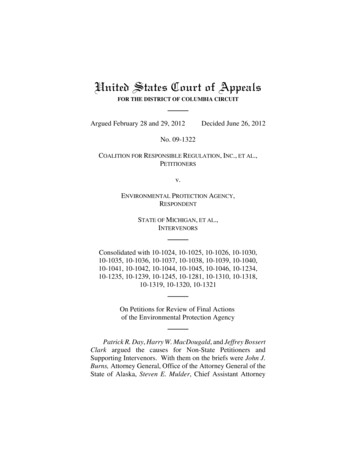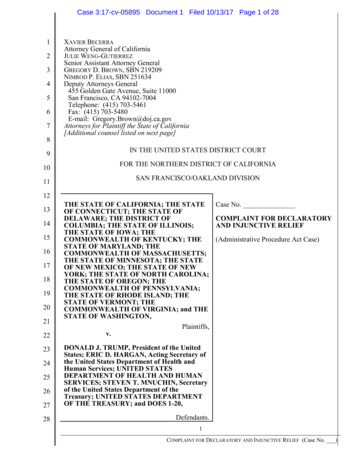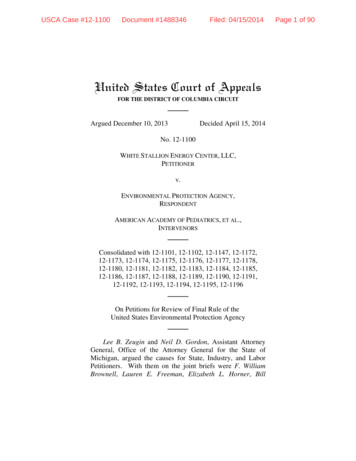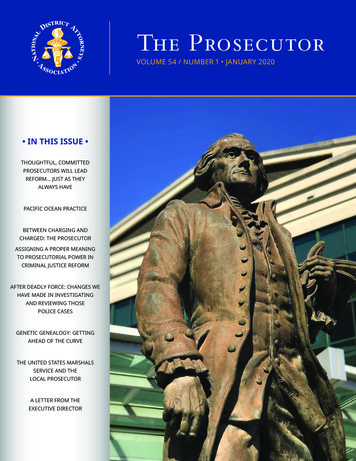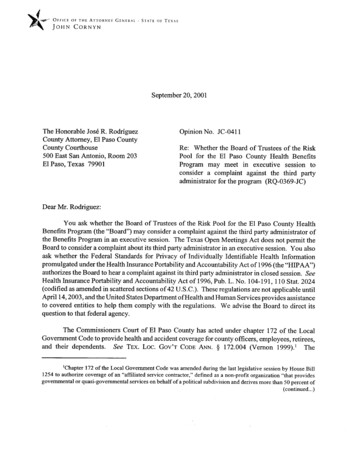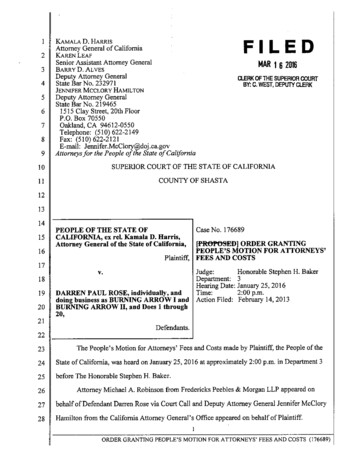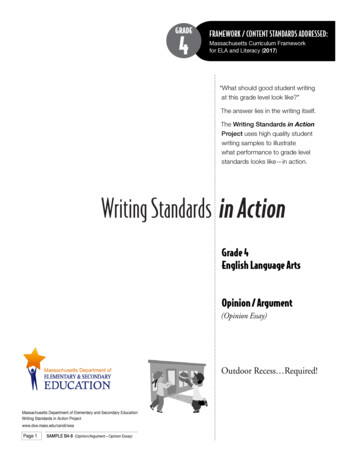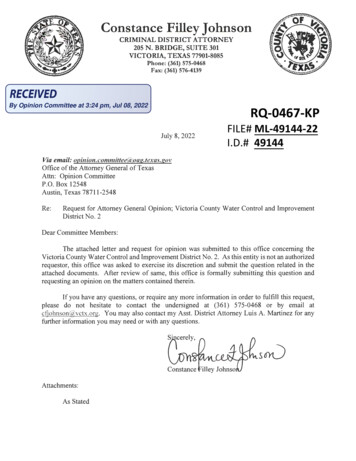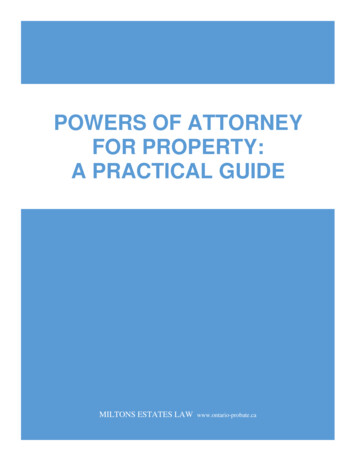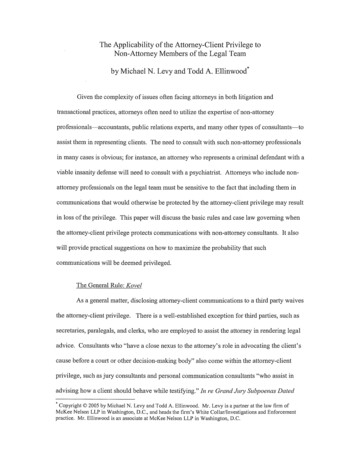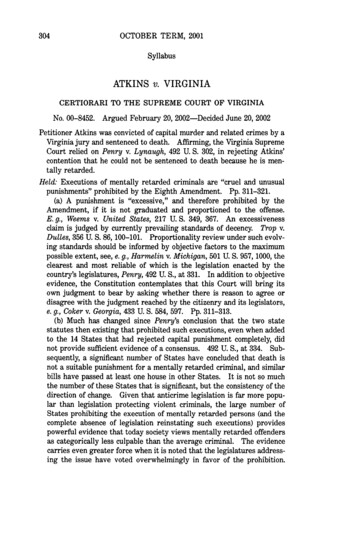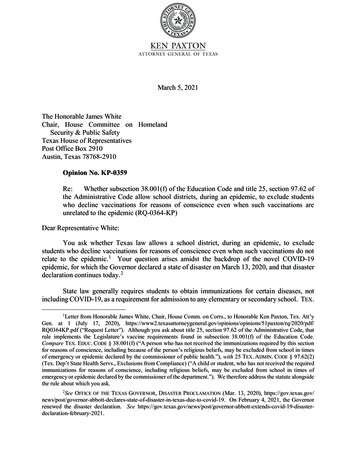
Transcription
KEN PAXTONATTORNEY GENERAL OF TEXASMarch 5, 2021The Honorable James WhiteChair, House Committee on HomelandSecurity & Public SafetyTexas House of RepresentativesPost Office Box 2910Austin, Texas 78768-2910Opinion No. KP-0359Re:Whether subsection 38.001(f) of the Education Code and title 25, section 97.62 ofthe Administrative Code allow school districts, during an epidemic, to exclude studentswho decline vaccinations for reasons of conscience even when such vaccinations areunrelated to the epidemic (RQ-0364-KP)Dear Representative White:You ask whether Texas law allows a school district, during an epidemic, to excludestudents who decline vaccinations for reasons of conscience even when such vaccinations do notrelate to the epidemic. 1 Your question arises amidst the backdrop of the novel COVID-19epidemic, for which the Governor declared a state of disaster on March 13, 2020, and that disasterdeclaration continues today. 2State law generally requires students to obtain immunizations for certain diseases, notincluding COVID-19, as a requirement for admission to any elementary or secondary school. TEX.Letter from Honorable James White, Chair, House Comm. on Corrs., to Honorable Ken Paxton, Tex. Att’yGen. at 1 (July 17, 2020), nions/51paxton/rq/2020/pdf/RQ0364KP.pdf (“Request Letter”). Although you ask about title 25, section 97.62 of the Administrative Code, thatrule implements the Legislature’s vaccine requirements found in subsection 38.001(f) of the Education Code.Compare TEX. EDUC. CODE § 38.001(f) (“A person who has not received the immunizations required by this sectionfor reasons of conscience, including because of the person’s religious beliefs, may be excluded from school in timesof emergency or epidemic declared by the commissioner of public health.”), with 25 TEX. ADMIN. CODE § 97.62(2)(Tex. Dep’t State Health Servs., Exclusions from Compliance) (“A child or student, who has not received the requiredimmunizations for reasons of conscience, including religious beliefs, may be excluded from school in times ofemergency or epidemic declared by the commissioner of the department.”). We therefore address the statute alongsidethe rule about which you ask.1See OFFICE OF THE TEXAS GOVERNOR, DISASTER PROCLAMATION (Mar. 13, 2020), clares-state-of-disaster-in-texas-due-to-covid-19. On February 4, 2021, the Governorrenewed the disaster declaration. See tends-covid-19-disasterdeclaration-february-2021.2
The Honorable James White - Page 2EDUC. CODE § 38.001(a) (“Each student shall be fully immunized against diphtheria, rubeola,rubella, mumps, tetanus, and poliomyelitis, except as provided by Subsection (c).”). TheDepartment of State Health Services (“Department”) may require immunization against additionaldiseases beyond those listed in statute. Id. § 38.001(b); see also TEX. HEALTH & SAFETY CODE§ 161.004(a) (“Every child in the state shall be immunized against vaccine preventable diseasecaused by infectious agents in accordance with the immunization schedule adopted in departmentrules.”). 3 The Legislature created exemptions to the immunization requirements, including onefor students who decline an immunization “for reasons of conscience, including a religious belief.”TEX. EDUC. CODE § 38.001(c)(1)(B); see also TEX. HEALTH & SAFETY CODE § 161.004(d)(1); 25TEX. ADMIN. CODE § 97.62(2) (Tex. Dep’t of State Health Servs., Exclusions from Compliance).To obtain this exemption, students must submit an affidavit to the admitting official of theirelementary or secondary school stating the reasons for their declining the immunization. 4 Undernormal circumstances, submission of the affidavit will allow the student to attend school withoutthe required immunizations. But the Legislature created an exception to the exemption:A person who has not received the immunizations required by thissection for reasons of conscience, including because of the person’sreligious beliefs, may be excluded from school in times ofemergency or epidemic declared by the commissioner of publichealth.TEX. EDUC. CODE § 38.001(f). 5 You question whether this provision allows a school district toexclude students with an affidavit on file for any vaccine, or only the vaccine that prevents thedisease causing the declared epidemic. Request Letter at 1.In construing a statute, we aim to give effect to the Legislature’s intent, which requires firstlooking to a statute’s plain meaning. ExxonMobil Pipeline Co. v. Coleman, 512 S.W.3d 895, 899(Tex. 2017). “We presume the Legislature included each word in the statute for a purpose and thatwords not included were purposely omitted.” Id. The exception allowing for the exclusion of nonimmunized students in subsection (f) applies to any “person who has not received theimmunizations required by [section 38.001].” TEX. EDUC. CODE § 38.001(f) (emphasis added).The language chosen by the Legislature does not explicitly mention a nexus between the requiredvaccines and the emergency or epidemic allowing for the exclusion.3In addition to the statutorily required vaccinations, Department rules require vaccinations for pertussis,Haemophilus influenzae type b (Hib), hepatitis B, hepatitis A, invasive pneumococcal, varicella, and meningococcaldiseases. 25 TEX. ADMIN. CODE § 97.63 (Tex. Dep’t State Health Servs., Immunization Requirements in TexasElementary and Secondary Schools and Institutions of Higher Education).The affidavit must be submitted on a form promulgated by the Department. TEX. HEALTH & SAFETY CODE§ 161.0041(a).4In conjunction with the Governor’s disaster declaration, the Commissioner of Public Health declared apublic health disaster due to COVID-19 on March 19, 2020, and has done so each month since, most recently onFebruary 12, 2021. See state.tx.us/coronavirus/docs/PHDD-021221.pdf.Both the COVID-19 pandemic and theCommissioner’s repeated issuance of public health declarations for the same disaster create novel circumstances withno precedent.5
The Honorable James White - Page 3Notwithstanding the foregoing, the exception must be read in context. In re Ford MotorCo., 442 S.W.3d 265, 280 (Tex. 2014) (“In determining a statute’s meaning, we consider statutesas a whole rather than their isolated provisions.”) (quotation marks omitted). Education Codesection 38.001 has a narrow scope. It establishes vaccination requirements for Texas public-schoolstudents, provides exemptions from those requirements, and sets forth a limited exception to thoseexemptions. The vaccination exemptions—and the exceptions thereto—do not exist in a vacuum;they are inextricably tied to the list of required vaccines. Section 38.001 does not broadly addressthe State’s response to an epidemic, an issue addressed at length elsewhere in statute. 6 Only oncedoes section 38.001 reference an “epidemic,” and only in the exception to the exemption tovaccination requirements. See TEX. EDUC. CODE § 38.001(f). Read in context, the statute doesnot support a reading that school districts are vested with broad authority under subsection38.001(f) to exclude students from school based on risks to public health unrelated to the diseasescovered by the State’s vaccination schedules. See Cadena Comercial USA Corp. v. Tex. AlcoholicBev. Comm’n, 518 S.W.3d 318, 325 (Tex. 2017) (recognizing that courts enforce the plain meaningof a statute’s words unless another meaning “is apparent from the context, or the plain meaning ofthe words leads to absurd or nonsensical results”). A court likely would conclude that thisexception does not permit exclusion of students who lack vaccinations unrelated to an existingepidemic contemplated by subsection 38.001(f). 7The U.S. Supreme Court has considered laws requiring vaccinations during times of anemergency or epidemic and has concluded that generally it is within the police power of a state toprovide for compulsory vaccination to protect the public health and the public safety. Zucht v.King, 260 U.S. 174, 175–76 (1922) (considering a San Antonio ordinance that excluded studentsfrom school who had not been vaccinated against smallpox), Jacobson v. Mass., 197 U.S. 11, 25,39 (1905) (upholding a state law imposing a fine upon adults who refused to be vaccinated duringa smallpox epidemic); see also Tex. Att’y Gen. Op. No. GA-0178 (2004) at 6. In considering apredecessor statute to section 38.001, the Texas Supreme Court likewise found the statuteconstitutional as a proper exercise of the police power to protect the health and safety of Texascitizens. Itz v. Penick, 493 S.W.2d 506, 509 (Tex. 1973) (upholding the vaccination requirementswith exceptions during times of non-emergencies).The U.S. Supreme Court has explained that a state’s police power to compel vaccinationsmay not be wielded arbitrarily. The Court has recognized “that an acknowledged power of a localcommunity to protect itself against an epidemic” could be “exercised in particular circumstancesand in reference to particular persons in such an arbitrary, unreasonable manner, or might go sofar beyond what was reasonably required for the safety of the public, as to authorize or compel thecourts to interfere for the protection of such persons.” Jacobson, 197 U.S. at 28. In Jacobson, theindividual at issue refused a vaccination directly related to the pending health emergency. Id. at13. Both Zucht and Itz involved general challenges to the State’s ability to enforce a compulsoryvaccine requirement. Zucht, 260 U.S. at 175–76; Itz, 493 S.W.2d at 507. We find no case standingSee TEX. GOV’T CODE §§ 418.001–.261 (Texas Disaster Act); TEX. HEALTH & SAFETY CODE §§ 81.001–.408 (Communicable Disease Prevention and Control Act).6While the U.S. Food and Drug Administration has recently approved a COVID-19 vaccine for emergencyuse, it is not broadly available nor approved for use by children.7
The Honorable James White - Page 4for the proposition that the State may punitively exercise its public-health police power against anindividual who lacks an immunization entirely unrelated to a public health emergency.Given the express limitation in Jacobson on a state’s general police power during a publichealth emergency—it may not be wielded in an “arbitrary” or “unreasonable” manner—a courtlikely would refuse to read Education Code subsection 38.001(f) to allow exclusion of a studentwho lacks immunizations unrelated to the current COVID-19 pandemic. 8 See TEX. GOV’T CODE§ 311.021(1) (“In enacting a statute, it is presumed that . . . compliance with the constitutions ofthis state and the United States is intended . . . .”); In re Green, 221 S.W.3d 645, 649 (Tex. 2007)(per curiam) (“We must of course avoid a construction of a statute that renders itunconstitutional.”); HEB Ministries, Inc. v. Tex. Higher Educ. Coord. Bd., 235 S.W.3d 627, 658(Tex. 2007) (“We realize we must construe statutes to avoid constitutional problems when we can. . . .”). This result is all the more likely given that a student’s exclusion from school implicatesthe State’s public education obligations under the Texas Constitution. The Texas Supreme Courthas held that the constitutional requirement that the Legislature establish “an efficient system ofpublic free schools” is a guarantee that “extends not only to school children but to the public atlarge.” TEX. CONST. art. VII § 1; Neeley v. West Orange-Cove Consol. Indep. Sch. Dist., 176S.W.3d 746, 774 (Tex. 2005).Furthermore, to the extent students refuse vaccination on religious grounds, Texas lawprovides broad protections for those students’ religious freedom. See TEX. CONST. art. I, § 6; TEX.CIV. PRAC. & REM. CODE §§ 110.001–.012. The Texas Constitution provides: “No humanauthority ought, in any case whatever, to control or interfere with the rights of conscience inmatters of religion, and no preference shall ever be given by law to any religious society or modeof worship.” TEX. CONST. art. I, § 6. Some courts have opined that article I, section 6 of the TexasConstitution “provides greater protections for the free exercise of one’s religion than does thefederal constitution.” Ex parte Herrera, No. 05-14-00598-CR, 2014 WL 4207153, at *4 (Tex.App.—Dallas Aug. 26, 2014, no pet.) (mem. op.) (citing Howell v. State, 723 S.W.2d 755, 758(Tex. App.—Texarkana 1986, no writ)).The Texas Legislature, through the process of drafting the Texas Constitution, had a debateon the floor regarding the language that would become article 1, section 6 quoted above, and therewere two different provisions being debated – one more restrictive and one more broad. TheLegislature knowingly rejected the restrictive language and chose the broader provision in draftingthe language that was to become article I, section 6. In fact, one of the framers of the TexasConstitution offered a resolution creating an express exception for “good order, peace, or safety ofthis State.” See Journal of the Constitutional Convention of the State of Texas 47 (Sept. 10, 1875)(quoting resolution offered by Mr. Russell, of Harrison, which would have added language toarticle I, section 6 stating “but the liberty of conscience hereby secured shall not . . . justify8Briefing submitted in response to this request argues that “the compounding effect of multiple diseaseoutbreaks on community health and local health department resources can . . . overwhelm health care systems,” andthat “children . . . at risk for more severe outcomes from COVID-19 may include those who are unable to receivenecessary vaccinations for medical reasons.” See Brief from Donald P. Wilcox, Vice President & Gen. Counsel, Tex.Med. Ass’n, to Honorable Ken Paxton, Tex. Att’y Gen. at 1 (Aug. 7, 2020) (on file with the Op. Comm.). Thoseconcerns may be factors a court would consider in determining whether a decision to exclude a student was arbitraryor unreasonable.
The Honorable James White - Page 5practices inconsistent with the good order, peace, or safety of this State, or with the rights ofothers”). Such restrictive language was not adopted by the framers.However, the Texas Supreme Court has previously rejected an argument that an individualmay rely on article I, section 6 of the Texas Constitution to assert a religious objection tomandatory vaccinations for an epidemic in the relevant jurisdiction as a condition for public-schoolattendance. City of New Braunfels v. Waldschmidt, 207 S.W. 303, 308–09 (Tex. 1918) (“[T]hereligious freedom, guaranteed by the U.S. Constitution, does not deprive Congress of legislativepower, whereby actions may be reached which violate social duties. No more does section 6 ofthe Bill of Rights in our state constitution relieve one from obedience to reasonable healthregulations, enacted under the police power of the state, because such regulations happen not toconform to one’s religious belief.”). Given the purpose of an Attorney General opinion is to adviseon how Texas courts would rule on the legal question presented by the opinion request, we arebound to follow Texas Supreme Court precedent. See Tex. Att’y Gen. Op. No. GA-1003 (2013)at 1. While the above quoted language is broad, the Texas Supreme Court did not directly rule onyour narrow question – i.e., whether a student could be excluded from public school if he or shehad not taken vaccinations unrelated to an epidemic on the basis of religious belief.In addition to article I, section 6, the Texas Religious Freedom Restoration Act providesanother layer of protection for religious freedom in Texas. See TEX. CIV. PRAC. & REM. CODE§§ 110.001–.012. To the extent a student declined required immunizations due to a sincerereligious belief and a school decided to exclude such student during an emergency, a court wouldlikely consider whether that student’s exclusion from school violates that Act. Subsection110.003(a) of the Civil Practice and Remedies Code generally provides that “a government agencymay not substantially burden a person’s free exercise of religion.” Id. § 110.003(a). The fact thatthe government has declared a disaster does not change this. See In re Abbott, 601 S.W.3d 802,805 (Tex. 2020) (“The Constitution is not suspended when the government declares a state ofdisaster.”). A substantial burden on an individual’s free exercise will be upheld only if thegovernment agency imposing the burden demonstrates that it: “(1) is in furtherance of a compellinggovernmental interest; and (2) is the least restrictive means of furthering that interest.” TEX. CIV.PRAC. & REM. CODE § 110.003(b); see also Church of the Lukumi Babalu Aye, Inc. v. City ofHialeah, 508 U.S. 520, 546 (1993) (applying strict scrutiny when a law targets religious conductfor distinctive treatment or advances legitimate governmental interests only against conduct witha religious motivation).Government agencies have a compelling interest in preventing the spread of disease andprotecting the health of their citizens, but such regulations must also be narrowly tailored if theyconcern religious freedom. See Roman Catholic Diocese of Brooklyn v. Cuomo, U.S. ,141 S. Ct. 63, 67, 2020 WL 6948354 (Nov. 25, 2020) (“Stemming the spread of COVID-19 isunquestionably a compelling interest, but it is hard to see how the challenged regulations can beregarded as ‘narrowly tailored.’”). When government agencies take an action in furtherance ofthat interest that also burdens an individual’s free exercise of religion, the government agency mustuse the least restrictive means to further that interest. TEX. CIV. PRAC. & REM. CODE§ 110.003(b)(2).
The Honorable James White - Page 6The right to freely exercise one’s religion could include refusing a vaccine if receiving itconflicts with a person’s sincerely held religious belief. See Horvath v. City of Leander, 946 F.3d787, 793 (5th Cir. 2020). To the extent a student refuses vaccination on religious grounds, thequestion then becomes whether that student’s exclusion from school for refusing a vaccination fora disease not related to a current health emergency is the least restrictive means of preventing thespread of such disease and protecting public health. Whether exclusion from school is the leastrestrictive means of furthering a compelling government interest will involve numerous factualquestions that are beyond the scope of an Attorney General opinion. Garner v. Kennedy, 713 F.3d237, 242 (5th Cir. 2013); Tex. Att’y Gen. Op. No. GA-0864 (2011) at 2 (explaining that factualinquiries are beyond the scope of an Attorney General opinion). But to the extent a court findsless restrictive means exist, a court could conclude that a specific student’s exclusion from schoolunder Education Code subsection 38.001(f) violates the Texas Religious Freedom Restoration Act.
The Honorable James White - Page 7S U M M A R YPursuant to subsection 38.001(f) of the Education Code, theLegislature provided that a student who has not received theimmunizations required by law “for reasons of conscience,including because of the person’s religious beliefs, may be excludedfrom school in times of emergency or epidemic declared by thecommissioner of public health.” Read in context, a court likelywould conclude that this exception does not permit exclusion ofstudents who lack vaccinations unrelated to an existing “epidemic”contemplated by subsection 38.001(f).Depending on the particular facts at issue, a court could findexclusion from school for refusal to obtain a vaccine unrelated to theexisting epidemic to be arbitrary and unreasonable and overturn theexclusion for this purpose.Further, to the extent a school was to exclude a student whohad declined required immunizations unrelated to an existingepidemic due to a sincere religious belief, a court could find this tobe a substantial burden on the student’s religious freedom andpotentially a violation of the U.S. and Texas constitutions.Accordingly, subsection 110.003(a) of the Civil Practice andRemedies Code requires that only the least restrictive means offurthering a compelling government interest may be utilized inplacing such a substantial burden. If less restrictive means exist toaccomplish that objective, a court could find that a specific student’sexclusion in such circumstances from school under Education Codesubsection 38.001(f) violates the Texas Religious FreedomRestoration Act.Very truly yours,KEN PAXTONAttorney General of TexasBRENT E. WEBSTERFirst Assistant Attorney GeneralLESLEY FRENCHChief of StaffMURTAZA F. SUTARWALLADeputy Attorney General for Legal Counsel
The Honorable James White - Page 8VIRGINIA K. HOELSCHERChair, Opinion Committee
KEN PAXTON ATTORNEY GENERAL OF TEXAS March 5, 2021 . The Honorable James White Chair, House Committee on Homeland . Security & Public Safety Texas House of Representatives Post Office Box 2910 Austin, Texas 78768-2910 . Opinion No. KP-0359 . Re: Whether subsection 38.001(f) of the Education Code and title 25, section 97.62 of
